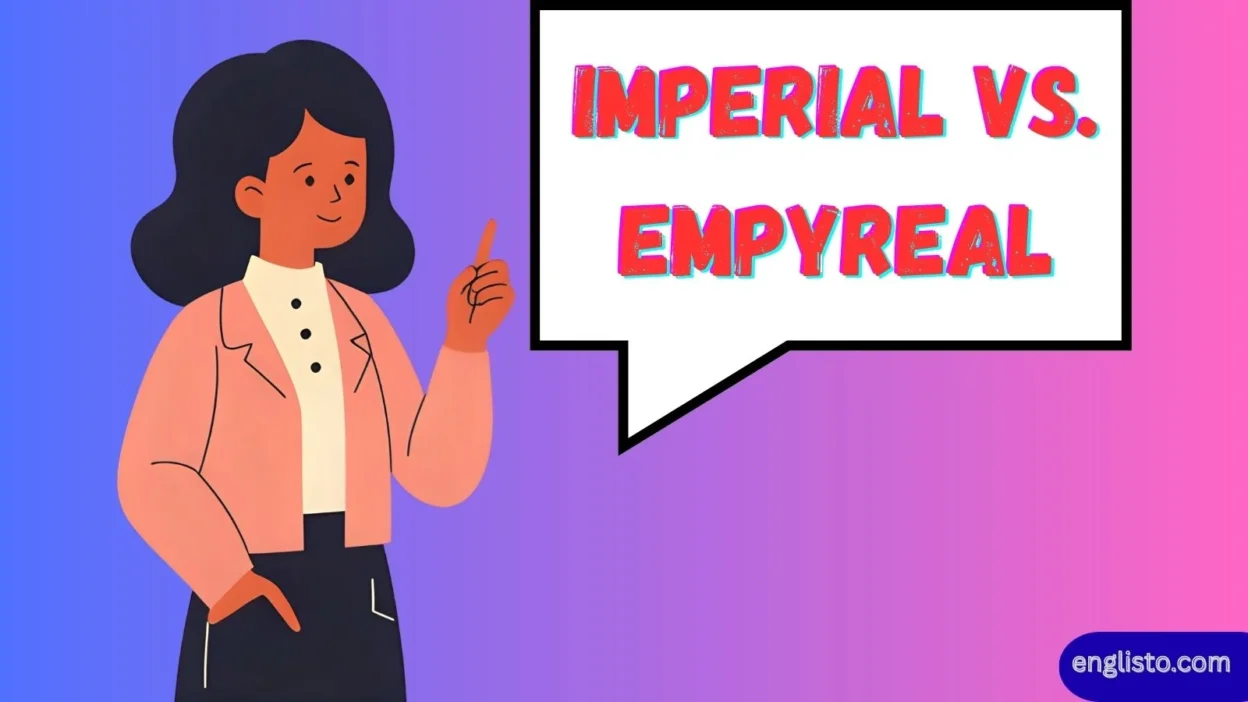Language has a peculiar way of pairing words that sound almost alike but open entirely different worlds of meaning. Among these fascinating pairs stand Imperial vs. Empyreal.” Both carry a sense of grandeur, majesty, and awe, yet they belong to contrasting realms—one rooted in earthly power and command, the other soaring toward heavenly heights and celestial wonder.
At first glance, they look like distant cousins: similar endings, rolling syllables, and an air of sophistication. Yet, their origins, usage, and connotations couldn’t be further apart. Understanding them isn’t just a matter of vocabulary—it’s about appreciating how history, literature, philosophy, and even science shaped these words.
This article dives deep into the nuances of imperial vs. empyreal: their etymology, pronunciation, real-life usage, synonyms, antonyms, literary echoes, and practical tips to master them without confusion.
The Etymology: From Rome to the Heavens
Etymology often reveals hidden worlds behind words. “Imperial” and “empyreal” share Latin roots but split paths in meaning centuries ago.
| Word | Origin | Root Meaning | First Recorded Use | Associations |
| Imperial | Latin imperialis from imperium (command, authority) | Pertaining to empire, rule, emperor | c.1200 (English) | Power, command, kings, Rome, emperors |
| Empyreal | Latin empyreus → Greek empyrios (“in the fire”) | Of the highest heaven, fiery, celestial | mid-14th century | Heaven, stars, divine, sublime, ethereal |
Imperium, the root of imperial, referred to the absolute authority of Roman rulers. From there, it extended to political dominance, kingdoms, and earthly power.- Empyreus, from Greek, spoke of the fiery heavens beyond the sphere of fixed stars, a place of divinity and transcendence. It eventually evolved into empyreal, describing things celestial, lofty, and otherworldly.
Pronunciation and Nuances
- Imperial: /ɪm-ˈpɪə.ri.əl/ → Emphasis on the second syllable.
- Empyreal: /ɛm-ˈpaɪr.i.əl/ or /ɛm-ˈpɪə.ri.əl/ → Two accepted pronunciations; both emphasize the middle.
Though they look similar, the sounds diverge. Imperial has a grounded, commanding tone; empyreal feels airy and luminous, almost floating.
Meaning and Usage in Context
Imperial
“Imperial” belongs to the domain of command, rule, and earthly authority. It evokes imagery of crowns, decrees, and empires stretching across continents.
Examples:
- The imperial crown jewels rest in the Tower of London.
- Marcus spoke with an imperial tone that silenced the courtroom.
- Inches, feet, and pounds belong to the Imperial system of measurement still used in the UK and Canada.
Key Associations:
- Empire, emperor, Rome
- Authority, command, decree
- Earthly grandeur, political hierarchy
- Imperialism, expansion, conquest
Empyreal
“Empyreal” belongs to the celestial and spiritual realm. It suggests brilliance, light, and the sublime qualities of the heavens.
Examples:
- Milton described the empyreal heights in “Paradise Lost.”
- The twilight sky glowed with empyreal beauty, studded with stars.
- Empyreal realms in mythology were home to gods and divine beings.
Key Associations:
- Celestial, heavenly, sublime
- Stars, cosmos, divine fire
- Literature, imagination, inspiration
- Ethereal, lofty, radiant
Literary Echoes: From Shakespeare to Milton
The true charm of these words lies in how writers across centuries used them.
- Imperial: Shakespeare frequently used it to signal majesty and dominance. Kings, princes, and courts often wore “imperial attire.”
- Empyreal: Milton in Paradise Lost painted the heavens as “the empyreal substance,” shimmering with divine fire. Romantic poets like Keats and Bryant leaned on it to describe lofty skies and transcendent landscapes.
Quote examples:
- “The imperial Caesar, dead and turned to clay…” – Shakespeare
- “Him the Almighty Power hurled headlong flaming from th’ethereal sky, with hideous ruin and combustion down to bottomless perdition.” – Milton (on empyreal heights)
Synonyms and Antonyms
| Word | Synonyms | Antonyms |
| Imperial | Regal, majestic, sovereign, kingly, dominant, commanding | Lowly, mundane, common, base, terrestrial |
| Empyreal | Celestial, ethereal, heavenly, sublime, lofty, radiant | Earthly, grounded, mortal, profane, ordinary |
Imperial vs. Empyreal in Modern Contexts
- Imperial still thrives in politics, measurement systems, branding (“Imperial Stout,” “Imperial Palace Tokyo”), and descriptions of earthly grandeur.
- Empyreal is rarer, mostly seen in poetry, religious contexts, astronomy, and philosophical musings. It lingers in literature, art, and spiritual writing where the otherworldly is evoked.
Examples:
- The Imperial family of Japan remains symbolic of continuity.
- Empyreal skies guided the imagination of medieval astronomers like Herschel and Plato.
Tricks to Remember the Difference
- Think Earth vs. Heaven: Imperial = Empire (earthly). Empyreal = Empyrean (heavenly).
- The Crown vs. The Stars: Imperial → crowns, emperors, Rome. Empyreal → stars, skies, paradise.
- Practical vs. Poetic: Imperial pops up in law, history, and measurement; Empyreal in poetry, religion, and imagination.
Common Mistakes and Confusions
- Some confuse empyreal with imperial simply because they look alike.
- “Empirial” is a misspelling that has appeared in British texts.
- They are not homophones but may sound similar depending on accent.
Real-Life Examples Across Domains
- History: Imperial Rome defined the Western political order; Medieval poets gazed at empyreal heavens for divine inspiration.
- Science: Imperial units like inches and gallons clash with the metric system; empyreal skies inspired astronomy and early physics theories of celestial fire.
- Literature: From Lydgate’s “Myrrour of the Worlde” to Milton’s “Paradise Lost,” empyreal persisted as a literary jewel.
FAQs
What’s the main difference between “imperial” and “empyreal”?
Imperial relates to earthly authority, empires, and command. Empyreal refers to heavenly, celestial, or sublime realms.
Are they homophones?
No. They’re similar but not identical in sound. “Imperial” stresses power, “empyreal” has a softer, ethereal sound.
Can “empyreal” describe people?
Yes, metaphorically. For example: Her voice carried an empyreal quality, soothing and luminous.
Why does “imperial” also mean a measurement system?
Because the British Empire standardized units like inches, feet, and pounds during expansion.
Which word is more common today?
“Imperial” is far more common. “Empyreal” is rare and poetic, often reserved for literature or spiritual texts.
Conclusion
Imperial and empyreal stand as linguistic mirrors—similar in form, worlds apart in meaning. One commands earthly realms with crowns, decrees, and authority. The other lights up the skies with celestial fire, lofty visions, and sublime wonder.
Together, they remind us of the power of language to bridge the earthly and the divine, the political and the poetic, the crown and the stars.
If you master their nuance, you’ll never confuse the imperial throne with the empyreal heavens again.



